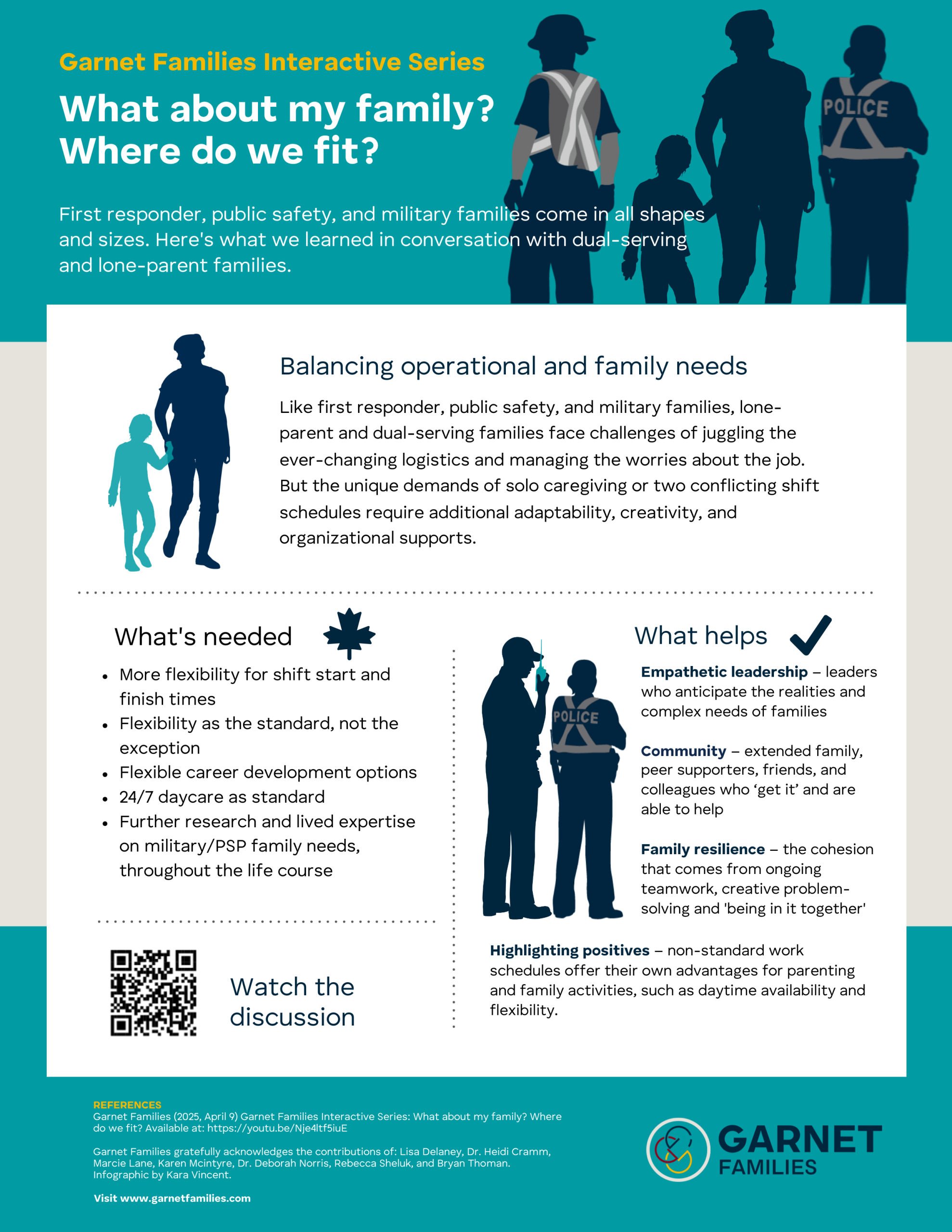Videos
Additional Resources
- Garnet Families – An online hub for information, resources, and support for improving the lives of defence and PSP families
- PSPNET Families – An online resource hub for information, strategies, and self-guided internet-delivered cognitive behavioural therapy for PSP spouses or significant others
What we learned
In this important conversation, panelists reflected on the experiences of military, veteran, and public safety families who have been less represented in research and workplace practices, such as lone parents and dual-serving families. Their stories highlighted not only the logistical juggling required in service life, but also the emotional load it carries too.
Whether it’s a long-anticipated date night canceled at the last minute or missing a child’s milestone because duty called, these are more than just scheduling conflicts. They carry an emotional weight that families must learn to navigate through flexibility and adaptability. For lone parents especially, the burden is not always about being “single,” but about being the sole available caregiver due to deployments, shift work, or postings. The shift from calling this “single parenting” to “lone parenting” is more than semantics—it’s about truly seeing and validating lived experience.
Across the conversation, one theme echoed loud and clear: community matters. Whether it’s extended family stepping in, peer supporters who just ‘get it’, or colleagues offering flexible coverage, these human connections help families weather the emotional ups and downs that come with being a Garnet family.
On a systems level, panelists emphasized that thoughtful shift design, repeated or hybrid training opportunities, and creative childcare solutions are not perks—they’re lifelines. When a couple can sit for coffee, or a parent can tuck in their child or spend time with their extended family because of smart scheduling, the ripple effect is profound and positive.
Empathetic leadership emerged as a cornerstone of lasting change. It starts with listening to the stories of families in all their complexity and building policies that reflect both their strength and their needs. Because families don’t come in one shape, and neither should the support we offer them.
And yes—let’s keep dreaming, together, about what could be. About 24/7 childcare that actually works. About systems that uplift the voices we haven’t heard enough. And about creating a world where every Garnet family thrives. Prepared by Lisa Delaney OT Reg. (Ont.)
About this discussion
This discussion took place on April 9, 2025, and was presented by: Lisa Delaney, OT Reg. (Ont.) (Community Development Lead, Garnet Families), Dr. Heidi Cramm (Professor, School of Rehabilitation Therapy, Queen’s University), Marcie Lane (Veteran, Canadian Armed Forces), Karen Mcintyre (Emergency Medical Services Paramedic Operations Regional Municipality of York), Dr. Deborah Norris (Professor, Department of Family Studies and Gerontology, Mount Saint Vincent University), Rebecca Sheluk, MSW, RSW (Mental Health Clinician, Paramedic and Senior Services) and Bryan Thoman (Emergency Medical Services Paramedic Operations, Regional Municipality of York).
Original event description:
Garnet families come in all kinds of shapes and sizes, forms, and functions. We invite you to join Dr. Heidi Cramm and Dr. Deborah Norris for a conversation about the experiences and perspectives of families not as commonly represented including single parent serving families and dual-serving families.
While this is an open event and all are welcome, please note, registration is required. Information gathered from this event will play a vital role in growing a community that will serve and support Garnet families across Canada. Following the event, attendees will be asked to complete a survey to inform the format, frequency, and themes of future Garnet Families activities. This event is presented in English with the option of French subtitles.
We would like to acknowledge the support of the Social Sciences and Humanities Research Council (SSHRC) Partnership Grant (What about the families? Strengthening a family’s research ecosystem for defence and public safety sectors) and the Medavie Foundation.
